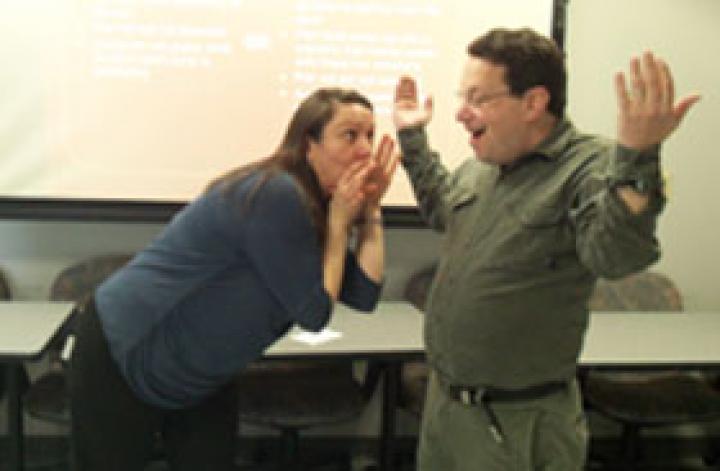Joe couldn’t figure out why after working in a company’s information technology department for several years, he had been passed over for a promotion.
His supervisor was surprised when Joe approached him about the promotion going to someone else.
His supervisor noted that since Joe never smiled at work, said hello to people, or sat with others at lunch, he figured Joe did not like working in the department. But what his supervisor was unaware of was that Joe had Asperger’s Syndrome, a form of high-functioning autism.
(To see the complete playlist with other videos click on the small play button on the right side of the player.)
Interacting with people, whether socially or on the job, can be a struggle for individuals with Asperger’s, like Joe. And it sometimes can cost someone a promotion or a job.
Building up the social skills so that people can lead a better quality of life and get a job is among several goals of the National Institute for People with Disabilities of New Jersey’s (NIPD/NJ) Asperger’s Skill Building Network. NIPD/NJ is part of the YAI Network.
The program, which began in 2010, is designed to help young adults and adults with Asperger’s or Asperger’s-like features. It meets from 10 a.m. – 3p.m. Mondays and Wednesdays at William Patterson University in Wayne, N.J.

Although a lot of learning occurs throughout the day, a typical day at the Asperger’s Skill Building Network “looks nothing like a typical day in any school I know,” according to Nancy O’Reilly, the program's first supervisor who is now consulting part time and has a background in special education (as well as, rehabilitation counseling).
A typical day can include acting games, role playing, art, game shows, in vivo social skills practice during lunch and monthly community outings, team building activities, and didactic instruction with a sprinkling of stress reduction strategies (e.g., deep breathing, meditation, yoga) throughout the day to minimize anxiety in the moment and help the participants develop coping skills to use outside of group.
Unlike in a school environment, no one tells the participants what to do and not do, according to Alex Gitter, Superivsor of the program. Instead, the group learns about the different social skills and it’s up to each individual if he or she wants to use them. Or as Alex puts it, “we’re giving you tools to put in your tool box to use when, and if, you want.”
Showing how things are related, however, helps participants realize how a certain social skill might be helpful when it comes to making friends or getting a job.
“These individuals have experienced so much negative feedback,” said Alex. “They’ve been told by their parents, teachers, supervisors and others what they’ve done wrong; they’ve been bullied by peers.”
That explains why so much time and energy is spent on creating a safe and trusting environment for participants to hear and give each other feedback. As a result, they are able to try out different behaviors without feeling judged.
Joe participated in the program two years ago, and he still enjoys gathering for the alumni’s monthly dinner at the Wayne Hills Diner. “He’s the first to arrive and the last to leave,” Alex said.
As a participant, he longed for information that could help him in his life. Having never been diagnosed with Asperger’s until he was an adult, Joe didn’t have the benefit of services and supports the children on the spectrum have today. This program helped open Joe’s eyes to a new world.
Today, Joe has returned to school and is finishing up his master’s degree in computer sciences at New Jersey Institute for Technology. NIPD/NJ’s program helped him realize that he has value and can do more with his life.
And he formed friendships along the way.
